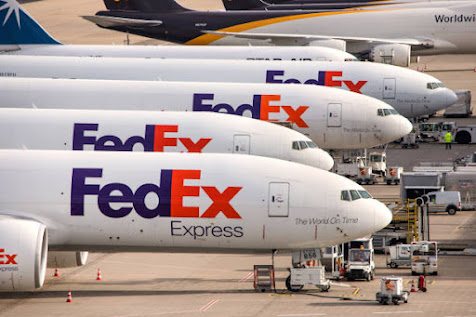FedEx, UPS both see PLUMMETING shipping volume as economy nears COLLAPSE.
The cargo market is imploding as shipping giants UPS and FedEx report precipitously declining package transit demand.
We know that the number of package flights operated by both FedEx Express and UPS "significantly declined month over month in July," according to Yahoo! Finance.
Since the spring of 2022, the overall cargo market has been waning. And the shipping industry's response thus far has been to impose new efficiency initiatives to try to lower costs and accommodate smaller express volumes.
Compared to the month of June, FedEx flew 9 percent fewer domestic flights in July. Year-over-year flight activity at the company was down 14 percent, according to investment bank Morgan Stanley.
From June to July, year-over-year declines in package volumes at UPS accelerated to 13 percent, up from 10 percent in June, while flight activity in May and June, comparatively, remained relatively stable.
Both FedEx and UPS have said they are reducing flight activity while also attempting to streamline their air infrastructure as part of a multi-year effort to reduce structural costs and improve profit margins.
Another way FedEx is reducing costs is by removing 29 aircraft from its fleet, either by permanent retirement or temporary storage. For the last fiscal year, which ended on May 30, FedEx retired 18 of its older aircraft and reduced global fight hours by 12 percent during the final quarter.
Wider freight recession that began last year continues as global economy heads toward cliff.
Over at UPS, there were additional problems this summer as some of its bigger customers diverted their business to FedEx and other competitors due to worry about a possible strike by its delivery drivers and warehouse workers.
That worry was eliminated this past week, however, when the Teamsters union ratified a new five-year contract ensuring a steady labor force, at least for the time being.
Still, UPS has had to make some big changes just like FedEx has, significantly reducing aircraft block hours, which contributed to a $343 million decrease in operating expenses for both its international air and ground network.
Ever since last year, there has been a wider freight recession occurring in the air cargo sector. Data from the Cirium Ascend consultancy group shows that total freight hours in July fell 7 percent year over year, while BMO Capital Markets came up with a 5.7 percent decline in dedicated freighter flight hours.
Even Amazon, the junk-peddling e-commerce monopoly, is reducing the growth rate of its private cargo airline fleet, though the company has not yet made any larger-scale adjustments like FedEx and UPS have – but it is probably coming.
"Flight activity at Amazon Air dipped 2% month over month in July after being flat in June," Yahoo! Finance reported. "Compared to last year, Amazon's flight counts actually increased 16%, three points better than in June."
"Amazon's year-over-year flight growth in July was the highest since February 2022. The flight performance aligns with an 11% increase in Amazon's North American retail sales during the second quarter and a record Prime Day last month."
While Amazon is clearly stealing market share from both FedEx and UPS, hence the latter two companies' declines, the failing economy is also a major factor. Amazon can only monopolize things for so long before even it succumbs to the building wave of economic collapse that looms in the distance.
Keep in mind as well that much of the higher shipping volume that occurred during the Wuhan coronavirus (COVID-19) "pandemic" has since come back down to earth, which partially explains the decreasing shipping volume and all the adjustments taking place at FedEx and UPS.
FedEx, UPS both see PLUMMETING shipping volume as economy nears COLLAPSE - STATIONGOSSIP



Comments
Post a Comment